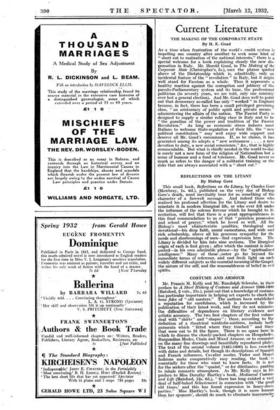Current Literature
AT a time when frustration of the world's credit system is impelling one country after another to seek some kind of " short cut to realization of the national interests," there is a special welcome for a book explaining clearly the new dis- pensation in Italy. Mr. Harold Goad, in The Making of the Corporate State (Christopher's, Ss.), uses the phrase quoted above of the Dictatorship which is, admittedly, only an incidental feature of the " revolution " in Italy, but it might well stand for Fascism as a whole. Thus it represents a healthy reaction against the corruption• and jobbery of the pseudo-Parliamentary system arid its bane, the professional politician (in seventy years, we arc told, only one ministry ever lost a general election). And Mr. Goad does well to point out that democracy so-called has only " worked " in England because, in fact, there has been a small privileged governing class, " an aristocracy of public spirit and private means " administering the affairs of the nation. The Fascist Party is designed to supply a similar ruling class in Italy and to be the guardian of the power and tradition of the Fascist Revolution." As long as economic stress induces most Italians to welcome State-regulation of their life, the " new political constitution " may well enjoy wide support and deserve all Mr. Goad's encomiums. If, as he claims, it has generated among its adepts a " new seriousness . . . . a new devotion to duty, a new social conscience," etre., that is highly commendable. But what is chiefly needed in the world to-day is surely not a new form of the religion of Nationalism but sense of humour and a fund of tolerance. Mr. Goad never so much as refers to the danger of a militarist training or the risks that arc always associated with a " short cut."


















































 Previous page
Previous page